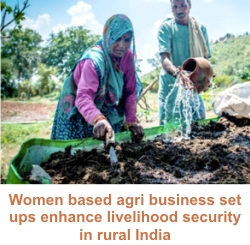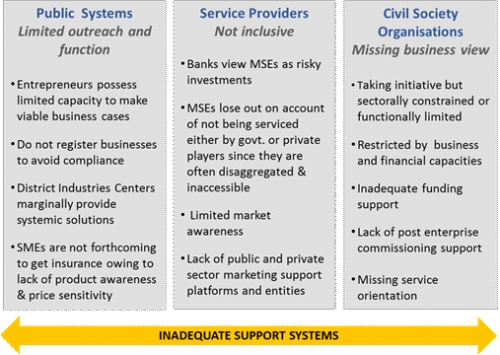|
Scaling Up Mechanisms for Entrepreneurship Micro enterprises are engines that boost job creation and fuel equitable economic development. However, despite their crucial role as enablers of improved local capacities and jobs, their growth is limited owing to lack of a nurturing ecosystem. Dialogue with rural communities and local stakeholders over the past few years, has revealed the unmet demand of support services for setting up and improving micro enterprises. Less than 5% of the potential entrepreneurs are aware of the types of enterprises that can be established. Moreover, only 1 out of 15 entrepreneurs are able to access formal credit and close to 85% report restricted access to relevant marketing channels. It is therefore evident that there is a need to bridge this growing gap between entrepreneurs and service providers.
Emerging Sectors: Ensuring Environment Sustainability and Enhanc Owing to its journey on the path of economic reforms, India has transformed into one of the fastest growing economies if the world. It is estimated that with its large and growing population and exponentially increasing GDP, it shall soon join the league of developed economies over the next 10 years. This development is however impossible without the transformation of its growing population into a major productive workforce. The top five potential sectors that have emerged in the recent times and are likely to hold their position in the future are green building materials, waste, agri and food, rural services and basic need enterprises. Green building material and agriculture sectors have the highest employment generation potential in India. Technology innovation for fly ash brick making machines, C&D waste, eco-concrete, low carbon cement, marble sludge among others are increasingly becoming popular. 62 million tonnes of solid waste is produced in the country every year, of which only 12 million tonnes is treated and the rest dumped. This provides a huge untapped opportunity. Indian waste has big business potential and is set to become a $13 billion industry by 2025. Over the past 30 years, Development Alternatives has supported over 500 enterprises in agri and paper waste management. In the agriculture sector, on-farm, off-farm and farming services based business models have been demonstrated on ground along with women led aggregation platforms for production and marketing. Sakshi Producer Company, an aggregator-women based agri business set up in Bundelkhand to nurture economic development and enhance livelihood security by strengthening local value chains, has a turnover of INR 20,00,000/year with 500 customers. “102 women invested INR 1000 share capital with 10 board members. Now we have a turnover of INR.20,00,000”, says Sakshi. Development Alternatives has demonstrated new technology and IT service based innovative livelihood models in the rural economy developed with young girls such as printing and downloading centre (Gopalganj, Bihar), computer training centre (Shravasti, UP) and information and data management centre (Delhi). Approximately 80% of rural India’s basic needs remain unmet. Currently at USD 12 billion, consumer goods market in rural India is expected to grow to USD 100 billion by 2025. Basic need solutions like water service based enterprises or biomass pellet (cooking fuel) manufacturing enterprises are the way to fulfil these unmet needs.
Challenges: Constrained
Development of Micro Enterprises
The key challenges faced by MSMEs can be summarised as below: Lack of business competence of entrepreneurs and support systems: There is increasing evidence that despite the presence of entrepreneurial skills, poor access to training systems and low ability to take risks minimises entrepreneurship development. For instance, in India only 22% of aspiring entrepreneurs who plan to start business have access to formal or informal training in India, against an Asia average of 44%1. The lack of connect between supporting entities and entrepreneurs further inhibits the growth of these enterprises. Poor access to key business inputs: Over 32% of enterprises have inadequate market linkages2 leading to irregular revenue cycles. In the case of finance, only 5% of enterprises have access to formal finance3 as banks view MSMEs as risky investments. The gap in debt finance is accentuated due to un-served micro and underserved small enterprises which constitute 80% of MSMEs in India. Lack of a robust and lucrative ecosystem: There is increasing evidence that poor infrastructure and inadequate market support systems are among key factors that limit the growth of the MSME sector in emerging economies. Transforming the Rural Micro-Enterprise Landscape Against this backdrop, the Development Alternatives Group is planning to develop a digital marketplace, which will fulfill the service gap between entrepreneurs and service providers, and a financial platform that will ensure continuity of credit support to micro entrepreneurs. It has operationalised a self-sustaining business entity to service the needs of entrepreneurs as well as other key stakeholders in the ecosystem, across geographies and sectors through its special purpose vehicle - India Micro Enterprise Development Foundation (IMEDF). IMEDF aims to create a positive ecosystem for boosting entrepreneurship in India by addressing this gap and developing itself as the one stop-shop solution for enterprise development support. This will be achieved in a phased manner, wherein the first phase will demonstrate micro enterprise development in sectors like rural services, basic needs provision and agri processing (for boosting economic development) and green building materials and waste (for environment sustainability). The second phase will focus on piloting the financial platform, a catalytic credit support fund that will mobilise resources from various stakeholders and ensure acceleration of enterprise development. It has been conceptualised in a manner, such that the systems that are set up are self-propelling. The digital marketplace and the catalytic fund will be embedded within the self-sustaining special purpose vehicle – IMEDF. By doing so, these engines will continue to service more businesses with information and networking support contributing to building local prosperity and wealth. In addition to this, sustained interactivity between stakeholders would be ensured through monitoring and information sharing mechanisms operating on the digital platform. Moving forward in subsequent years, this will be scaled out to impact larger areas through a network of ‘acceleration hubs’ run by civil society organisations. These network partners will then be supported to provide high quality enterprise support services through direct handholding and digital tools. The platforms will converge on the digital market place, which will facilitate knowledge exchange. Five years down the line, IMEDF aims to support at least 100 enterprises per day, accelerating enterprise development across the country. ■
Priyali Bhardwaj
Endnotes
|

